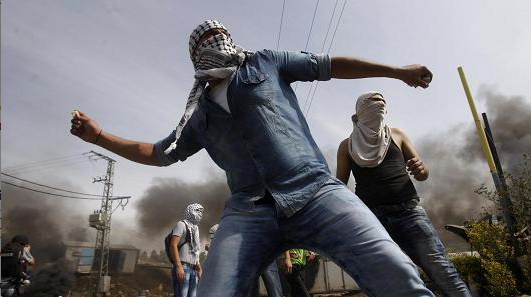
The past month has seen a spike of violence amongst Palestinians and Israelis across Israel and the occupied territories. Some are calling this wave a third Intifada, or uprising, the previous two events occurring in 1987 and 2000 as a result of Palestinian frustration towards the occupation. As of October 28, this month has seen 64 Palestinian deaths and 10 Israelis. Israeli deaths have been caused by Palestinian male youth, mostly stabbing attacks leaving both the Israeli and the stabber dead at the hands of Israeli authority. The killing of these young men committing stabbing attacks on Israelis is seen as justified, as they are a threat to Israeli security but there have been several deaths of innocent Palestinians as a result of unnecessary force used by both Israeli Defense Forces (IDF) and Israeli civilians.
This uprising looks familiar in most Palestinian communities around the West Bank with daily protests demonstrating Palestinians’ frustration with the system they are living in, these protests often being broken up by the IDF where excessive force is typically shown, including tear gas, firing rubber bullets and live ammunition.
Israel has held a military occupation of most Palestinian territories for the past 48 years and the Palestinians’ land has continued to shrink in order to make way for settlements for Israeli Jews. The occupation gives Israel control of everything; from access to water, electricity, the economy, and basic infrastructure. Some of the major effects of the occupation include the checkpoints that make traveling even a small distance difficult, Israel’s confiscation of Palestinians’ land and the building of settlements for Israeli Jews in violation of international law, and the lack of basic rights that are given to Israeli Jews such as the right to vote in the system that has absolute control of their lives. Life as a Palestinian is life as a second class citizen.
Living under these conditions has built up years of frustration and political unrest in Palestinians yet when media sources report on any violence or protest occurring, they fail to mention the occupation. These events do not occur in a vacuum, in order to understand the actions of Palestinians, the stage must be set accurately. Violence is an inevitable result of occupation; while Israeli extremism comes from a place of unconditional privilege, Palestinian extremism is the result of decades of oppression and injustice. Due to the overwhelmingly-supported Israeli state, Palestinians have lost their homeland, their families and the right to defend or have a claim over both.
Violence is used when no other tool is available. The Palestinian people have gone from one brutal occupation to another, have been stripped from their basic human rights and ignored by the international community for too long that the only way to be heard, the only way to express their anger can be achieved with violence. The dehumanization of Palestinians takes away the legitimacy of their experiences of oppression by writing them off as terrorists. While we must certainly condemn these violent acts committed by Palestinians, we must also condemn the unjust and marginalizing system Israel maintains.
The United States’ blind support of Israel goes unchallenged, for example the United States was the only country to vote against holding Israel accountable for war crimes in the 2014 Gaza War; a vote that included 41 nations. This fight is most present on college campuses around the States, often causing tension between Jewish and Palestinian student groups. Most recently, Boston University Students for Justice in Palestine demonstrated against IDF violence on their campus and later received a threatening email. Criticizing Israel is not anti-Semitic, just as anti-Zionism is not anti-Semitic. We must challenge these racial injustices regardless of our own affiliations or lack thereof.
